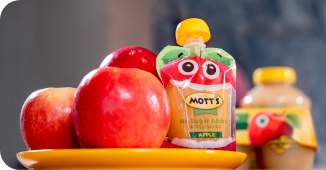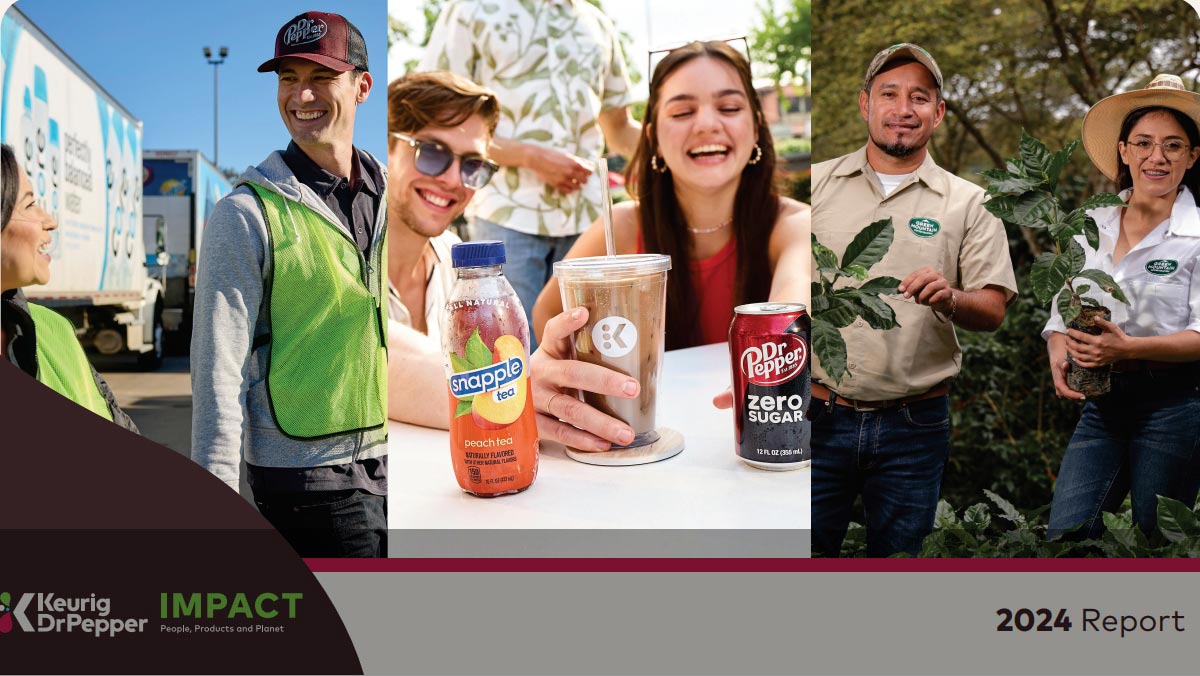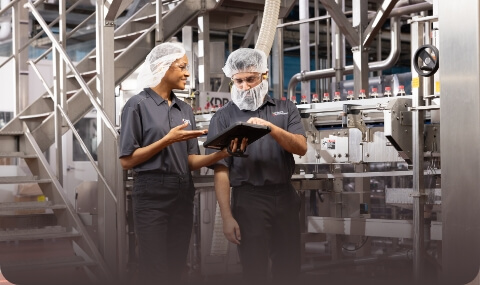Consumer Health & Well-Being
Strategy
As a leading beverage company, KDP recognizes there are systemic issues relating to health, hunger and nutrition that are complex and require individual and collective action to address. Core to our approach is working alongside community and public health organizations as well as credentialed health and well-being experts to understand needs and how KDP can support solutions. With a company vision to provide a beverage for every need, anytime, anywhere, we are committed to offering product options within a balanced portfolio. This means less sugar, more functionality and nutrients and smaller portion offerings.
Consumer Health & Well-Being Strategy

Renovation, Innovation & Transparency to Empower Consumer Choice

Responsible Marketing & Merchandising to Expand Access to Product Options with Low Calories, Zero Sugar or Functional Benefits

Product/Ingredient Quality & Safety
We actively participate in discussions with stakeholders aimed at replicating and accelerating initiatives designed to increase access to our full portfolio of products, including our low calorie, low sugar and nutritional offerings. This extends to collaborating with groups who are working to address health disparities in communities. We continue to advocate for informed consumer decision-making by providing transparent, straightforward and easily comprehensible information on our packaging and online. In addition, we regularly engage with stakeholders such as investors, nonprofit organizations, public health groups and government agencies to identify and respond to any emerging issues, safety concerns or misleading information to protect the interests and well-being of our consumers.
Management Approach
KDP’s cross-functional teams, including Product Development, Scientific & Regulatory Affairs, Operations, Marketing, Commercial Sales, Engineering and Corporate Affairs, collaborate to advance our consumer health and well-being efforts.
Specific to our positive hydration goal, we work with Partnership for Healthier America (PHA), a nonprofit committed to advancing access to nutritious food for all in America. Through our multi-year partnership, PHA is providing KDP health and well-being advice and annual validation of our positive hydration goal progress and marketing disclosure.
We also have compliance programs and review systems to implement KDP’s product safety and quality standards, which are aligned to legal and regulatory requirements. All of KDP’s products comply with applicable regulations set by the U.S. Food and Drug Administration (FDA), the Canadian Food Inspection Agency (CFIA), Health Canada (HC) and Mexico’s Federal Commission for Protection against Health Risks (COFREPRIS) and Office of the Federal Prosecutor for the Consumer (PROFECO). In addition, we comply with the U.S. Department of Agriculture’s (USDA) Smart Snacks in School standards. We go one step further in the U.S. by displaying voluntary front-of-pack calorie labels on many beverage containers. For our Keurig coffee makers, rigorous development and safety processes and procedures are overseen by teams within our Global Product Organization, including the Appliance Safety Management Committee and the Appliance Product Safety Council.
We have established several policies that outline our approach and reinforce our commitment to consumer health and well-being. They include KDP’s Chemicals Management Policy, Responsible Marketing Policy, Responsible Public Policy Advocacy in the United States Policy and Supplier Code of Conduct. Specific to animal testing, we state in our Supplier Code of Conduct that our suppliers shall strive to avoid animal testing altogether. Where it cannot be avoided, suppliers shall have a responsible animal testing policy and procedures in place. KDP does not test our products on animals.
of our U.S. corporate marketing budget promoted products that met the definition of positive hydration in 2024
reduction in added sugar from U.S. Refreshment Beverages since 2020

Collaborated with retailers and dieticians to expand access to low calorie products in 160 stores across the U.S. mid-Atlantic and east coast

Continued to deliver on our commitment to not market or advertise any of our products to children

Dr Pepper Zero had the most volume sales growth out of all Dr Pepper trademarked products, including regular Dr Pepper and Diet Dr Pepper, in 2024
* A product meets the positive hydration criteria if it: provides a serving of fruits or vegetables (with no added sugar) OR is 40 calories or less per serving with a functional attribute or at least 10% Daily Value of a nutrient to encourage. Positive hydration goal is for U.S. sales only; includes owned, licensed and partner brands and fountain beverages, excludes private label; examples of products that meet these criteria include non-caloric coffees and teas, 100% fruit juice with no added sugar, low-calorie energy and soft drinks and sparkling, still and functional waters.
We strive to offer a broad, well-balanced portfolio of quality products that is accessible to all consumers and marketed responsibly.
- We are committed to expanding our product offerings with lower sugar and calories and/or deliver nutritional and functional benefits, including offering a low-calorie or no-calorie option for virtually every full-calorie brand.
- In 2020, we engaged a mix of external, credentialed experts in public health, nutrition, fitness, mindfulness and academia to establish the criteria for which products provide positive hydration*. We set a goal that by 2025, 60% of our products in the U.S. provide positive hydration. In 2024 – one year ahead of the deadline – we have achieved this goal.
- To support our positive hydration goal, we collaborate with PHA. Through our multi-year partnership, PHA is providing KDP health and well-being advice and annual validation of our positive hydration goal progress and marketing disclosure.
* U.S. sales only; includes all owned, licensed and partner beverage brands, excludes private label.
Positive Hydration Progress
A product meets the positive hydration criteria if it: provides a serving of fruits or vegetables (with no added sugar) OR is 40 calories or less per serving* with a functional attribute** or at least 10% Daily Value of a nutrient to encourage***. Positive hydration goal is for U.S. sales only; examples of products that meet these criteria include non-caloric coffees and teas, 100% fruit juice with no added sugar, low-calorie energy and soft drinks and sparkling, still and functional waters.
* U.S. FDA definition of “low calorie,” Code of Federal Regulations, Title 21.
**European Commission: “A food product that together with its basic nutritional impact has a beneficial effect on one or more functions of the human organism either improving the general physical conditions or/and decreasing the risk of the evolution of the disease.” Orrύ S, et al. Nutrients 2018.
***Drewnowski A, et al. Nutr Rev. 2019; Dietary Guidelines for Americans, 2000-2025.
- Beyond the products that meet the criteria for positive hydration, we continue to expand consumer choices that complement a balanced lifestyle. Efforts can include reducing sugar and/or sodium and calories. For example, KDP began the multi-year process to reformulate our Hawaiian Punch recipe to reduce the sugar and calories in the beverage without sacrificing the great taste consumers love. Our team of scientists made minor and gradual adjustments to the formula each year to reduce the high fructose corn syrup levels resulting in a final product that is 40 calories per 12 fl oz.
- We have added smaller portion sizes of our full-calorie beverages in mini sizes to give people the opportunity for treat occasions while being mindful of their calorie consumption. In addition, we participate in the Portion Balance Coalition, a group of public health organizations and food and beverage manufacturers that promote awareness of how portion sizes fit within a healthy diet.
- We continue to invest in the manufacturing and distribution of emerging beverage categories to expand consumer choices with more options. Examples include the distribution of the unsweetened sparking water brand, Polar Seltzer, the addition of select products from our acquisition of Ghost and our investments in the non-alcoholic market with Athletic Brewing Company, among others.
- KDP hosts websites for the U.S. and Canada, that provide detailed information about our products. These websites offer comprehensive nutrition, allergen and certification information, allowing visitors to easily compare products, check compliance with USDA Smart Snacks in schools or verify Fair Trade certification and review packaging attributes such as recycled content and nutritional information for fountain beverages based on product, cup size and ice level.
- In the U.S. we have a Responsible Marketing Policy that serves as a guiding framework for how we present the benefits of our products to consumers. It applies to all KDP-authorized products, brands and communications. For example, employees of KDP and those on our account teams at media agencies who include advertising among their primary responsibilities are trained and educated on our Policy’s contents.
- In the U.S., we are a member of the Better Business Bureau’s Children’s Food and Beverage Advertising Initiative (CFBAI). As participants, we comply with the advertising standards set in CFBAI’s Core Principles and report annually on our pledge not to engage in advertising directed to children 13 and under unless the product being advertised meets CFBAI’s strict nutrition criteria*. In 2024, KDP complied with this commitment and did not advertise to children under age 13, regardless of the product’s nutrition profile.
- We partner with retailers on in-store marketing and merchandising pilots and continue to expand our work to additional neighborhoods and retailers. Examples of these programs include:
- In a low-income, ethnically diverse neighborhood in Boston, Massachusetts, KDP and Stop & Shop tested in-store marketing and merchandising strategies that prioritized the placement of products, such as Core Hydration, Bai, Evian, Snapple Zero Sugar and Polar Seltzer. The results of the 2022 pilot showed that in-store strategies, such as front-of-store racks, end-cap displays, aisle cut outs and front-end coolers, could influence consumers to make healthier choices.
- In 2023, we partnered with regional grocer Jewel-Osco to provide samples of KDP’s Bai products in stores located in South Side Chicago, a community with a high poverty rate, a high sugar-sweetened beverage consumption rate and a lack of access to varied food options. In tandem with sampling in-store, we worked with a local nonprofit, Project H.O.O.D., to provide community members with information about our low and zero sugar beverages and support a give-away that provided these drinks along with healthier food options during their community food and beverage drive.
- In Pennsylvania, we teamed up with the retail dietitian team from supermarket chain Redner’s Markets in 2023 to promote our Bai and Core Hydration products in 44 stores via price promotions and a “HealthCents” merchandise wall.
- In late 2024, KDP and grocer Giant Foods partnered to take over the “Healthy Hutch” incremental shelf at all 165 Giant Food stores in the U.S. Over a three-month period, the Giant Foods Healthy Living team featured one of KDP’s products in the Community Impact Hutch as “Handpicked by Our Nutritionists.” Rotated monthly, the KDP product (either Core Hydration, Bai or Snapple Zero Sugar) was offered at a sale price and highlighted in the Giant Foods circular as “Products that are a Better Option for Healthier Choices”. The program resulted in a sales increase of more than 80% and indicated more shoppers purchasing these options on display**.
- KDP is a member of the Hunger To Health Collaboratory’s (H2HC) Leadership Council and works alongside The Greater Boston Food Bank and Stop & Shop to help address pressing national health challenges and promote an equitable and nutrition-secure future.
*KDP considers child-directed advertising to be a program or website where the audience generally consists of 25% or more of children under the age of 13. This is a stricter standard than required by CFBAI, which considers media primarily directed at children under 13 when the audience is 35% or more of that age group.
**Compared to expected base sales for total KDP products.
- We work to manage Chemicals of Concern and the identification of opportunities to reduce or eliminate the use of certain chemicals where feasible or required by law within packaging and products by engaging our supply chain per our Chemicals Management Policy and Supplier Code of Conduct .
- Within our Supplier Code of Conduct, we state that our suppliers shall strive to avoid animal testing altogether. Where it cannot be avoided, suppliers shall have a responsible animal testing policy and procedures in place. KDP does not test our products on animals.
- Our food safety systems include Preventative Controls and Hazard Analysis and Critical Control Point (HACCP) method, an internationally recognized system of identifying and managing food safety-related risks.
- Every KDP manufacturing site is audited annually to confirm whether it meets or exceeds requirements set by the Global Food Safety Initiative (GFSI), an industry-recognized coalition that oversees food safety standards.
- These programs include internal and third-party audits to review our food safety processes and controls.
- Annual food safety and quality training is required for our KDP manufacturing facility employees.
- All our coffee makers meet or exceed the market-leading safety standards of Underwriters Laboratories (UL) and UL of Canada under normal use.
- Our Keurig Commercial brewers also meet or exceed the safety standards of the National Sanitation Foundation under normal use.
- For all of our coffee makers, we apply a robust testing program throughout the coffee maker development and production lifecycle to identify potential use cases and failure modes to support appliance quality and consistency of operation over time.




